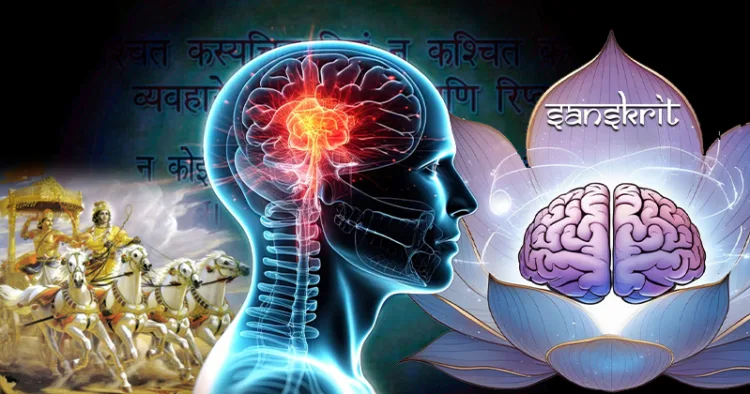Sanskrit shlokas like Jyotirgamaya and Aham Brahmasmi not only offer spiritual benefits but may also play a role in treating mental health conditions, according to a study by the Centre of Bio Medical Research (CBMR) in Lucknow. The research found that listening to Sanskrit shlokas stimulates multiple areas of the brain in a positive way, a benefit not observed with words or sounds from other languages.
Study published in Springer Nature
This study by CBMR has been published in the esteemed international journal Springer Nature. Dr Alok Dhawan, the institute’s director, explained that the purpose of the research was to explore the connection between the brain and Sanskrit verses. Since 2012, the institute has been conducting research on the effects of Vedic Sanskrit on brain functioning.
Study Participants
The study involved 44 participants, divided into two groups:
Group 1: Sanskrit scholars who had studied Vedic Sanskrit for an average of 12 years.
Group 2: Individuals who were proficient in Hindi and English but had no knowledge of Sanskrit.
In the study, the brain’s response was measured by reciting both Sanskrit shlokas and artificial shlokas to the participants
Activating Brain Regions Through Shlokas
The study revealed that when the Sanskrit scholar group listened to shlokas, specific regions of their brain were activated—regions typically engaged during activities like listening to music or appreciating art. This response was not observed in individuals who were only familiar with Hindi or English. Additionally, the temporal region of the brain, which often becomes inactive in conditions like Alzheimer’s disease, showed increased activity due to the influence of shlokas.
MRI Brain Examination
Magnetic Resonance Imaging (MRI) was employed to assess brain activity during the study. Both groups were alternately exposed to recitations of Sanskrit shlokas and artificial shlokas. The MRI results revealed significant brain activity in the group of Sanskrit scholars when they listened to authentic Sanskrit shlokas. This heightened activity was not observed when they were exposed to artificial shlokas or recitations in other languages.
Potential for Treating Mental Illnesses
The identification of brain areas activated by Sanskrit shlokas suggests that these ancient verses could play a role in treating mental health conditions, including Alzheimer’s and depression. Listening to shlokas stimulates a positive energy flow in the brain, which may contribute to restoring mental balance and well-being. This opens up exciting possibilities for incorporating Sanskrit shlokas into therapeutic practices for mental health in the future.
The Profound Link Between Sanskrit and Mental Health
The connection between Sanskrit and mental health goes beyond the spiritual realm, extending into the scientific domain. Research indicates that Sanskrit scholars tend to be not only more mentally stable but also possess higher cognitive functions, with their brains exhibiting more activity compared to those who speak other languages. This highlights the powerful impact of Sanskrit on both mental well-being and intellectual capacity.















Comments